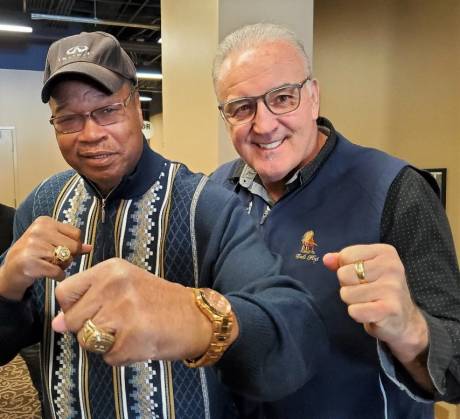
One-time rivals and now close friends, former World Boxing Council heavyweight boxing champion Larry Holmes and former WBC No. 1 contender Gerry Cooney are in opposite corners when assessing the current state of professional boxing.
“I tell everybody – put ESPN Boxing on your phone and follow it. See the upcoming fights. Read the stories. Boxing is so exciting right now, in all the weight classes – men and women,” Cooney said.
Not so fast, according to Holmes.
“It sucks,” Holmes said, leaving little doubt of his opinion. “The big names aren’t out there. I’m not out there and Gerry’s not out there.”
Holmes and Cooney, photo at top, who squared off on June 11, 1982, at Caesars Palace in Las Vegas in a heavyweight title match with racial overtones, were together again this afternoon as part of the Legends & Stars Sports Expo at Batavia Downs Gaming.
They were among about three dozen former professional sports stars who signed memorabilia during the two-day event.
While Holmes, 74, and slowing down a bit, was a man of few words, Cooney, on the other hand, soaked up his time with light-hearted chatter and a willingness to have his photograph taken with the fans.
Cooney, 66, said he is a keen boxing observer and influencer, who talks about the sport on Sirius XM radio channel 156 on Monday and Friday afternoons. He admitted that boxing has lost its luster in recent years but sees a resurgence.
“People lost trust in boxing because there were so many mismatches and (promoter Don) King was doing his stuff. People turned away. They didn’t want to invite their children to it,” he said. “But now, those people who walked away from the game – they’re missing what’s going on. Boxing is great, in all the divisions.”
He rattled off several names, including Tyson Fury, Oleksandr Usyk, Joe Joyce, Canelo Alvarez, and New Yorker Jared Anderson, and women standouts Katie Taylor and Amanda Serrano, which make him optimistic about boxing’s future.
“People walked away because the guys who really won weren’t getting the decisions. The scores were terrible. It’s all getting better,” he offered.
Cooney said the fact that there were so many different organizations and various “champions” also didn’t enhance the public’s perception of the sport. He said now organizers have “stripped down some of those divisions and that’s a good thing.”
When asked about that bout against Holmes – a fight in which both combatants were paid $10 million – Cooney said the promoters labeled him “The Great White Hope” and pushed the racial aspect that divided fans.
“There was so much racism back then,” he said. “It wasn’t about him and it wasn’t about me. I was in a camp with six or seven guys I went to high school with. We were eating lobster tail and turtle soup. We didn’t have any time for that.
“But they worked on us. I think the promoters, in that fight, promoted that to make money.”
At the time, Holmes, known as the “Easton (Pa.) Assassin” had a 39-0 record with 29 knockouts. Cooney, a Long Island native, was 25-0 with 22 knockouts.
Fighting in front of a Nevada record crowd of 29,214 and a worldwide pay-per-view audience, Holmes won by a technical knockout in the 13th round. It was a hard-fought match, with Holmes sending Cooney to the canvas in Round 2 and the challenger being penalized three points on low blows.
Not long afterward, Holmes reached out to a dejected Cooney, starting their enduring friendship.
Photo by Mike Pettinella.
